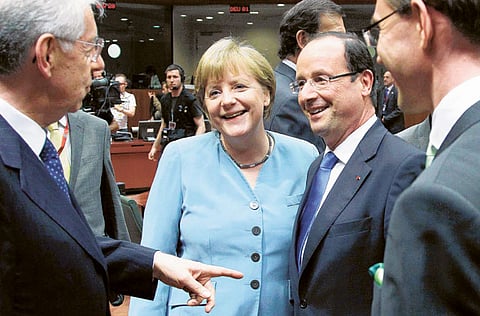EU still dithering as Greece sinks
No answers given about how to spark economic growth and restore confidence

Brussels: European Union leaders concluded their latest summit early yesterday with few concrete steps to fix the continent's festering financial crisis even as the potential for a messy Greek exit from the euro appears to be rising. Some leaders stressed the importance of planning for just such an event but offered no measures that might help Greece avoid it.
Also left unresolved was what Europe should do to spark economic growth and restore the confidence of investors, who have driven some countries' borrowing costs to unsustainable levels. The fiscal austerity agenda that Germany has promoted as the solution to Europe's problem of too much government debt has been met with rising scepticism in other euro countries.
The leaders of the 27 EU countries agreed to give institutions such as the European Investment Bank the task of drawing up proposals for growth in time for another summit in June. But there was discord over more aggressive actions promoted by some leaders heading into the summit, such as issuing bonds jointly as a way of reducing borrowing costs for heavily indebted nations among the 17 countries that use the euro.
The perception that European leaders lack the political will to tackle the continent's financial and economic problems has left markets on edge for weeks. Recession is spreading. Banks are under pressure. The biggest fear is that if Greece cannot be saved, other larger economies — like Spain or Portugal — might face the same fate.
The euro countries "have to consider all kinds of events," Luxembourg Prime Minister Jean-Claude Juncker told reporters after a European Union summit, but insisted that "the working assumption" was that Greece would remain part of the euro. Leaders gathered in Brussels recognised that Greece had endured significant hardships and promised to release development funds aimed at spurring growth.
But the statement from Juncker, who also chairs meetings of Eurozone fin-ance ministers, was a frank admission that Greece could wind up abandoning the euro. The country's fringe political parties, which are threatening to renege on commitments made to secure bailout loans, saw their popularity surge in recent elections. No party has been able to form a government, and the country will vote again June 17.
Political uncertainty
Many analysts have said that Greece, already in its fifth year of recession, has no hope of recovery if it sticks to the spending cuts and tax hikes it agreed to in order to secure bailout loans.
"We want Greece to remain in the euro area," German Chancellor Angela Merkel said after the meeting. "We expect that they will stick to the commitments that they have entered into."
Political uncertainty in Greece is just one of the fires the Europe needs to put out. Leaders are also worried about rising borrowing costs in Spain and Italy that could force them to seek bailouts, just like Greece, Portugal and Ireland did.



